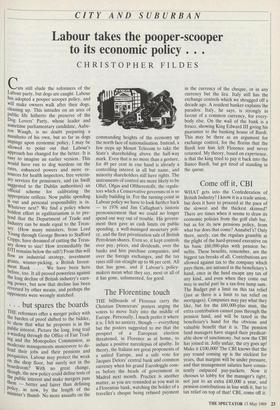• • . but spares the boards THE reformers offer
a merger policy with the burden of proof shifted to the bidder, to show that what he proposes is in the Public interest. Picture the long, long trail a-winding through the Office of Fair Trad- ing and the Monopolies Commission, as Moderate managements manoeuvre to de- fend their jobs and their pensions and perquisites. Labour may protect the weak on the shop floor, but surely not in the boardroom? With no great change, though, the new policy could define tests of the public interest and make mergers pass them — better and fairer than defining Policy, as now, by the length of the Minister's thumb. No more assaults on the commanding heights of the economy up the north face of nationalisation. Instead, a few steps up Mount Telecom to take the State's shareholding above the half-way mark. Even that is no more than a gesture, for 49 per cent in one hand is already a controlling interest in all but name, and minority shareholders still have rights. The instruments of control are more likely to be Oftel, Ofgas and Oftherestofit, the regula- tors which a Conservative government is so kindly building in. For the turning-point in Labour policy we have to look further back — to 1976 and Jim Callaghan's historic pronouncement that we could no longer spend our way out of trouble. His govern- ment then gave us cash limits on public spending, a well-managed monetary poli- cy, and the first privatisation sale of British Petroleum shares. Even so, it kept controls over pay, prices, and dividends, over the banks and hire purchase companies, and over the foreign exchanges, and the tax rates still ran straight up to 98 per cent. All that has gone, and if Labour's policy- makers mean what they say, most or all of it has gone, unlamented, for good.


























































 Previous page
Previous page